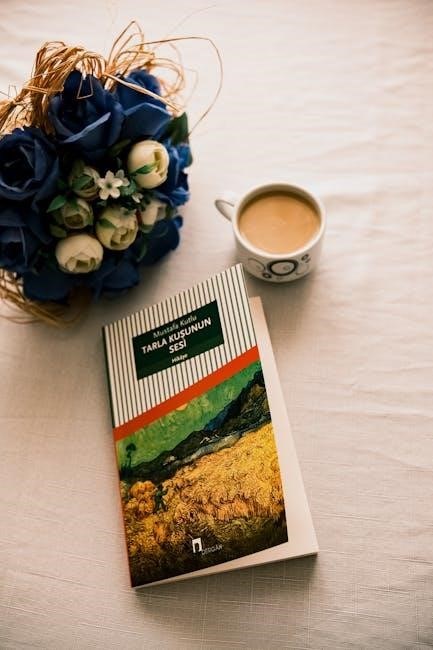Iddo the Seer, a prophet during the divided monarchy, is known for his writings chronicling the reigns of Solomon, Rehoboam, and Jeroboam. His lost book, referenced in 2 Chronicles, provides historical insights into this period.
1.1 Who Was Iddo the Seer?
Iddo the Seer was a prophet and chronicler active during the early divided monarchy of Israel and Judah. He is noted for his divine revelations and historical recordings, particularly of King Solomon and Rehoboam’s reigns. His writings, though lost, are referenced in 2 Chronicles, highlighting his significance as a seer and recorder of Israel’s history. His role underscores the importance of prophetic documentation in ancient Israelite society.
1.2 The Mention of Iddo in the Bible
Iddo the Seer is referenced in the Bible, specifically in 2 Chronicles 9:29, 12:15, and 13:22. These verses highlight his role as a prophet and chronicler, noting his writings about King Solomon, Rehoboam, and Abijah. The biblical mentions emphasize the significance of his works, which are now lost, but were once integral to understanding the history of Israel and Judah during the divided monarchy.
1.3 The Significance of His Writings
Iddo the Seer’s writings are highly significant as they provide historical insights into the reigns of Solomon, Rehoboam, and Jeroboam. His works, though lost, are referenced in the Bible, indicating their importance as chronological and prophetic records. These writings offer a unique perspective on the political and religious dynamics of the divided monarchy, making them invaluable for understanding ancient Israel’s history and the role of prophetic traditions during that era.

Historical Context of Iddo’s Time
Iddo the Seer lived during the divided monarchy, a time of political and religious upheaval in ancient Israel, marked by the reigns of Solomon, Rehoboam, and Jeroboam.
2.1 The Divided Monarchy of Israel and Judah
The divided monarchy period began after King Solomon’s death, splitting Israel into two kingdoms: Judah, ruled by Rehoboam, and Israel, led by Jeroboam. This era marked political and religious turmoil, with Judah maintaining Jerusalem’s Temple while Israel established alternative worship sites. Iddo the Seer lived during this time, witnessing the kingdom’s fracturing and the subsequent struggles of both nations, providing a critical context for his prophetic writings and historical records.
2.2 Key Events During Iddo’s Lifetime
During Iddo’s lifetime, key events included the reign of Solomon, the construction of the Temple, and the subsequent division of the kingdom into Israel and Judah. After Solomon’s death, Rehoboam ruled Judah, while Jeroboam led Israel, marking the beginning of the divided monarchy. These events shaped the political and religious landscape, influencing Iddo’s prophetic role and the historical context of his writings, which chronicled these significant transitions and their impact on the people.
2.3 The Role of Prophets in Ancient Israel
Prophets in ancient Israel served as divine messengers, conveying God’s will to the people. They acted as moral and spiritual guides, often admonishing kings and leaders for straying from divine commandments. Their role extended beyond prophecy, as they recorded historical events and provided theological interpretations. Iddo, as a seer, was part of this tradition, offering insights and chronicles that preserved the history and spiritual lessons of his time, influencing both religious and political spheres.
The Lost Book of Iddo the Seer
Iddo the Seer authored a book chronicling the reigns of Solomon, Rehoboam, and Jeroboam, but it has been lost to time, leaving only biblical references.
3.1 What the Book Contained
The Book of Iddo the Seer chronicled the reigns of King Solomon, Rehoboam, and Jeroboam, providing a detailed account of their lives and rule. It included historical events, prophetic visions, and divine revelations, offering insights into the political and religious climate of the divided monarchy. The book was a valuable historical source, capturing the transition of power and the spiritual state of Israel and Judah during this pivotal period.
3.2 The Structure and Purpose of the Book
The Book of Iddo the Seer was likely structured chronologically, detailing events during the reigns of Solomon, Rehoboam, and Jeroboam. Its purpose was to document historical events and prophetic visions, serving as both a historical record and a source of divine guidance. The book aimed to bridge the gap between historical narrative and prophetic revelation, offering insights into the spiritual and political challenges of the time.
3.3 Why the Book Was Lost
The Book of Iddo the Seer was lost over time, likely due to the perishable nature of ancient manuscripts and the limited circulation of non-canonical texts. As religious authorities compiled the Hebrew Bible, texts not deemed essential were excluded, leading to its disappearance. Its absence remains a significant gap in understanding the historical and prophetic context of the divided monarchy.
References to Iddo’s Book in the Bible
The Bible references Iddo’s book in 2 Chronicles 9:29, 12:15, and 13:22, highlighting its historical and prophetic significance during the reigns of Solomon and Rehoboam.
4.1 Mentions in 2 Chronicles
In 2 Chronicles, Iddo’s writings are referenced in 9:29, 12:15, and 13:22. These verses highlight his role in chronicling the reigns of Solomon, Rehoboam, and Abijah, emphasizing his prophetic insights. The mentions underscore the historical significance of his lost book, which provided detailed accounts of the divided monarchy and Jeroboam’s rule. These references remain crucial for understanding Iddo’s contributions to biblical history and prophecy.
4.2 Connections to Other Biblical Texts
Iddo’s writings are connected to other biblical texts, such as the books of Nathan the prophet and Gad the seer, which also chronicled the reigns of David and Solomon. These connections highlight the collaborative nature of prophetic records in ancient Israel. Iddo’s work complements these texts, offering additional insights into the historical and religious context of the divided monarchy. His records align with the broader narrative found in 1 and 2 Chronicles, Samuel, and Kings, enriching the understanding of this pivotal era.
4.3 The Relationship Between Iddo and Other Prophets
Iddo the Seer is mentioned alongside other prominent prophets like Nathan and Gad, whose writings also chronicled the reigns of David and Solomon. His work aligns with theirs, suggesting a collaborative or complementary role in recording Israel’s history. Iddo’s prophetic contributions are part of a broader tradition where prophets documented events and revelations, often providing unique perspectives that enriched the biblical narrative. This connection underscores his significance within the prophetic community of his time.

The Importance of Iddo’s Writings
Iddo’s writings are vital for understanding the historical and religious context of the divided monarchy, offering unique insights into the reigns of Solomon and Rehoboam.
His lost book remains a significant mystery, highlighting the potential richness of prophetic literature from that era and its enduring influence on biblical scholarship.
5.1 Historical Insights into the Reign of Solomon and Rehoboam
The Book of Iddo the Seer provides unique historical insights into the reigns of Solomon and Rehoboam, offering details about their political decisions and the socio-religious climate of the time.
It chronicles the transition of power and the eventual division of the kingdom, highlighting prophetic warnings and their implications for the monarchy, bridging gaps in the biblical narrative.
Iddo’s account connects to other biblical texts, offering a fuller understanding of the period, making it a valuable, though lost, source for historians and scholars studying ancient Israel.
5.2 Religious and Cultural Significance
The Book of Iddo the Seer holds profound religious significance as it contains prophecies and divine revelations, offering insights into the spiritual climate of ancient Israel and Judah.
Culturally, it bridges the gap between historical events and religious traditions, providing a unique perspective on the societal and theological context of the divided monarchy, making it a vital, though lost, piece of religious heritage.
5.3 Contributions to Understanding the Period of the Divided Monarchy
Iddo’s writings provide invaluable insights into the political and religious dynamics of the divided monarchy, chronicling events during the reigns of Solomon, Rehoboam, and Jeroboam. His accounts offer a unique perspective on the theological and social challenges faced by Israel and Judah, helping scholars reconstruct this pivotal era. Though the book is lost, its references in biblical texts highlight its significance in understanding the historical context of the divided monarchy period.

Fragments and References in Other Sources
Fragments of Iddo’s writings appear in apocryphal texts and Jewish traditions, offering glimpses into his prophetic insights. Scholars identify connections through biblical references and historical records, though the full text remains elusive.
6.1 Apocryphal and Pseudepigraphical Works
Fragments of Iddo’s writings appear in apocryphal and pseudepigraphical texts, such as The Story of the Prophet Iddo and The Book of Shemaiah. These works reference his prophecies and historical accounts, offering insights into his role during the divided monarchy. While Iddo’s original book is lost, these sources preserve elements of his teachings and provide context for his influence on later religious traditions, making them valuable for understanding his legacy.
6.2 Jewish and Christian Traditions
Jewish and Christian traditions recognize Iddo as a significant prophet, with references in 2 Chronicles highlighting his role in recording historical and prophetic events. His works, though lost, are considered important for understanding the divided monarchy. Jewish tradition emphasizes his prophetic insights, while Christian interpretations sometimes link his visions to messianic themes. Both traditions acknowledge the value of his writings, reflecting enduring interest in his contributions to religious history and prophecy.
6.3 Modern Scholarship and Interpretations
Modern scholars explore Iddo’s writings as a bridge between history and prophecy. Researchers like WH Bennett and MJ Boda analyze his lost book’s significance, emphasizing its role in understanding the divided monarchy. Theoretical explorations of form criticism and practical applications of prophetic literature are key areas of study. While some scholars focus on the historical context, others examine the cultural and religious implications of Iddo’s visions, highlighting their enduring relevance in biblical scholarship and interpretation today.

The Legacy of Iddo the Seer
Iddo’s writings, though lost, remain influential in biblical scholarship, offering insights into ancient Israel’s history and prophetic traditions, inspiring modern research and interpretation.
7.1 Influence on Later Prophetic Traditions
Iddo the Seer’s writings laid a foundation for later prophetic traditions by blending historical records with divine revelations. His structured approach to chronicling events and prophecies likely influenced subsequent prophets in documenting their visions. The emphasis on conveying God’s messages to leaders and people, as seen in his works, became a hallmark of prophetic literature. Although his book is lost, its impact on the methodology and thematic focus of later prophets remains significant.
7.2 The Role of Iddo in Biblical Scholarship
Iddo the Seer’s lost book has become a focal point in biblical scholarship, with scholars exploring its potential contents and significance. The references to his writings in 2 Chronicles have sparked debates about the structure and purpose of prophetic texts. His work, though absent, invites researchers to consider the methodologies of ancient prophets and the compilation of historical accounts, making him a key figure in understanding the development of biblical literature.
7.3 The Search for the Lost Book in Modern Times
Modern scholars continue to explore ancient texts and manuscripts for fragments of Iddo’s lost book. Efforts focus on analyzing biblical references and apocryphal works for clues. Digital platforms and academic communities facilitate collaborative research, reigniting interest in Iddo’s potential insights into the divided monarchy. Despite its absence, the search underscores the enduring significance of Iddo’s writings in biblical history and scholarship.
Iddo the Seer’s lost book remains a mystery, yet its historical and religious significance endures through biblical references, offering glimpses into ancient Israel’s divided monarchy and prophetic traditions.
8.1 Summary of Key Points
Iddo the Seer, a prophet during the divided monarchy, authored a lost book chronicling the reigns of Solomon, Rehoboam, and Jeroboam. The book, referenced in 2 Chronicles, provided valuable historical and religious insights. Its disappearance remains a mystery, but its significance endures through biblical mentions, highlighting its role in understanding ancient Israel’s history and prophetic traditions. The loss of Iddo’s writings leaves a gap in our knowledge of this critical period;
8.2 The Enduring Mystery of Iddo’s Book
The disappearance of Iddo’s book remains a profound mystery, leaving scholars to speculate about its contents and fate. Despite its absence, references in 2 Chronicles highlight its historical significance. The book likely contained prophecies and chronicles of key biblical figures, offering unique insights into ancient Israel’s history. Its loss has sparked enduring curiosity, making it one of the most intriguing lost texts of the biblical era, with its legacy enduring through fragmented mentions.
8.3 Final Thoughts on the Significance of Iddo the Seer
Iddo the Seer’s legacy endures as a pivotal figure in biblical history, offering insights into the divided monarchy. His writings, though lost, remain significant through references in 2 Chronicles, highlighting his role as a prophet and chronicler. Despite the absence of his book, Iddo’s influence on biblical scholarship and understanding of the era continues, leaving a lasting impact on studies of ancient Israel’s history and religious traditions.